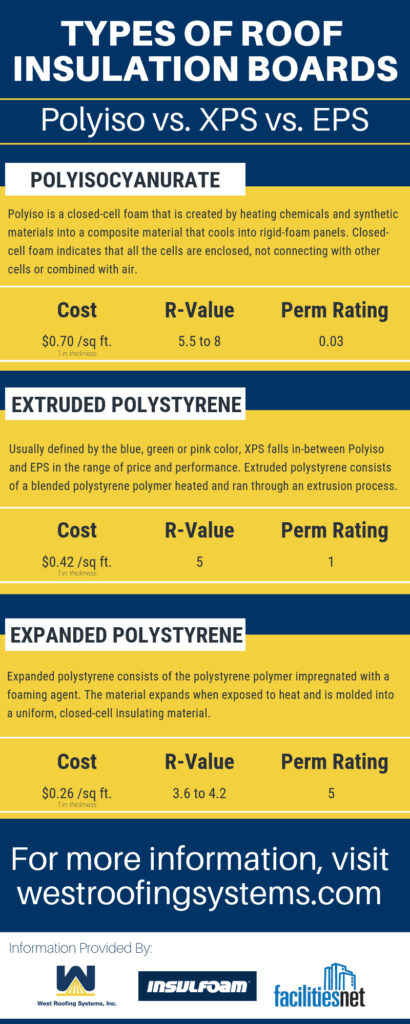Since typical membrane roofing does not include the insulation factor, as a customer you have more options to choose from to insulate your facility’s roof. There are a few types of insulation options the facility manager/owner can choose from:
- Polyisocyanurate (Polyiso)
- Extruded Polystyrene (XPS)
- Expanded Polystyrene (EPS)
Here at West Roofing Systems, we’ve been installing Membrane Roofing for over 45 years. And in that time, we are asked a lot of questions about not only roofing membranes, but types insulation as well. Because it is not only important to keep water and weather out but to keep your warm and cool air in.

Types Of Roofing Membrane Insulation
Polyisocyanurate
As the most used insulation type for roofing applications, Polyiso is a closed-cell foam that is created by heating chemicals and synthetic materials into a composite material that cools into rigid-foam panels. Closed-cell foam indicates that all the cells are enclosed, not connecting with other cells or combined with air.
The R-value starts at R-8 when installed and degrades down to R-5.5 over time (Cold-Weather Performance of Polyisocyanurate).
Extruded Polystyrene (XPS)
Usually defined by the blue, green or pink color, XPS falls in-between Polyiso and EPS in the range of price and performance. Extruded polystyrene consists of a blended polystyrene polymer heated and ran through an extrusion process. (Facilitiesnet.com)
XPS is semipermeable with a perm rating of 1. The average cost of extruded polystyrene insulation is $0.42/sq ft. for a 1 in thick panel. The average R-Value is R-5.
Expanded Polystyrene (EPS)
With the highest R-value per dollar, EPS is used for roof, wall and floor insulation. EPS can be used with for ground contact and does not retain water over time.
Expanded polystyrene consists of the polystyrene polymer impregnated with a foaming agent. The material expands when exposed to heat and is molded into a uniform, closed-cell insulating material. (Facilitiesnet.com) Commonly known as beadboard, EPS is also used to manufacture products like coffee cups.
Insulfoam: EPS Environmental Advantages
The average R-value is R- 3.6 to 4.2, depending on panel density.

![Types of Roof Insulation Boards [Infographic]](https://westroofingsystems.com/wp-content/uploads/2018/11/Types-of-Roof-Insulation-Boards-Infographic-1480x340.jpg)
